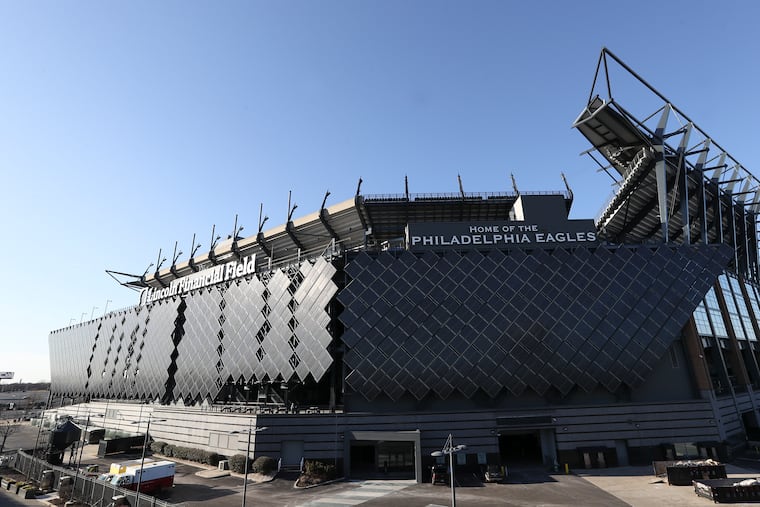The Linc is awarded highest certification for building sustainability
The Linc is already well-known for the 10,456 solar panels that wrap around the building and hover over the parking lot.

Lincoln Financial Field, home of the Philadelphia Eagles, just got a big green award.
The stadium has been given platinum level certification under the Leadership in Energy and Environmental Design (LEED) program developed by the U.S. Green Building Council, the Eagles announced Tuesday. It’s the highest level of certification awarded by the council. Previously, The Linc held a gold status that was awarded in 2018.
The LEED rating system has four levels based on a point system that ranges from 40 to 100: certified, silver, gold, and platinum, which is 80 points and above.
The Linc is already well-known for the 10,456 solar panels that wrap around the building and hover over a parking lot, producing 4 megawatts of renewable energy annually.
But the Eagles also note they were the first North American professional team to install a hydrogen refueling station to power company vehicles. And that the Linc recycles bottle caps, uses a water filtration system that eliminated the use of more than one million plastic bottles, and diverts 99% of waste from landfills, though it does send waste to a trash-to-steam plant monitored by the U.S. Environmental Protection Agency.
Norman Vossschulte, the Eagles’ vice president of fan experience and sustainability, notes that the stadium is more than 20 years old (it opened in 2003) and is one of only two already-built stadiums to earn platinum status. The other is U.S. Bank Stadium, home of the Minnesota Vikings, which opened in 2016.
Vossschulte said the organization had a number of initiatives over the years that help gain the new certification, including the installation of LED lights on hundreds of fixtures that helped reduce the wattage used from 1.4 million to 726,000, essentially cutting the power usage in half.
Vossschulte said management also scrutinized ways of reducing waste, working with food vendor Aramark by ripping open trash bags to see what was being thrown away and how.
“We looked at everything and we said, ‘What about cups? What about straws? What about plastic, paper?’”
So the Eagles began using biodegradable straws, for example. The team took old plastic seats to a company that turns them into other products such as a filler material for drywall. Seats have also been converted into benches for use in the stadium or in the city. The team now uses metal cans that can be more easily recycled in the club and suite levels.
A clean test of air quality of indoor spaces at the Linc helped tip the LEED certification toward gold, Vossschulte said. Buildings are typically tested for levels of carbon dioxide, particulate matter, and volatile organic compounds.
The nonprofit Green Building Council says its LEED program is the world’s most widely used green building rating system. LEED certifies that buildings operate at high levels of sustainability from the way they are built to the way they are run. More than 197,000 commercial and institutional properties participate in LEED through the U.S. and 186 countries and territories.
“By prioritizing sustainability, the Philadelphia Eagles are leading the way in their industry,” Peter Templeton, president and CEO of the U.S. Green Building Council, said in a news release.
Jason Miller, senior vice president of operations for the Eagles, said the certification “starts at the top with Jeffrey Lurie and Don Smolenski who continuously drive innovation with their engaging leadership style.”